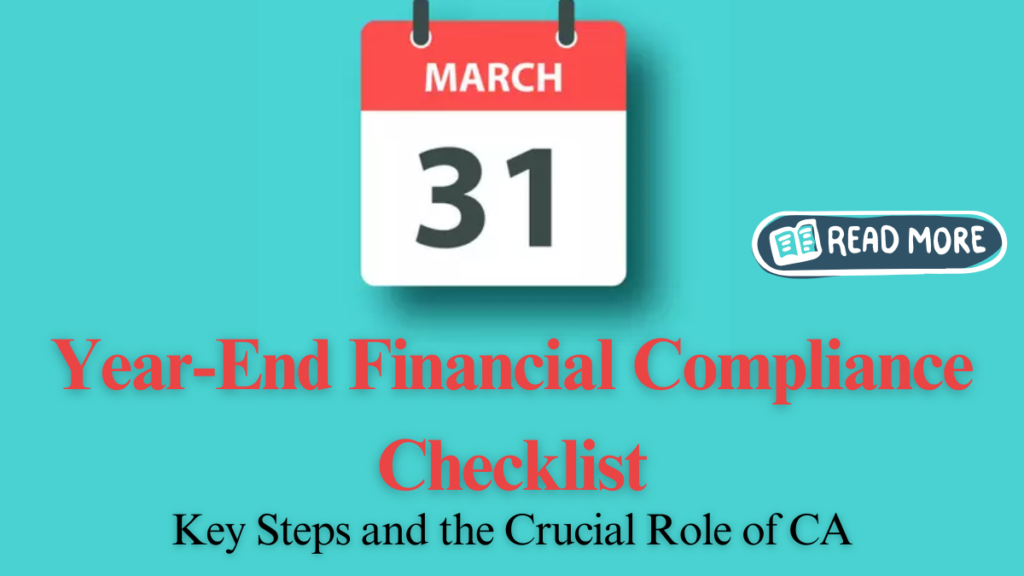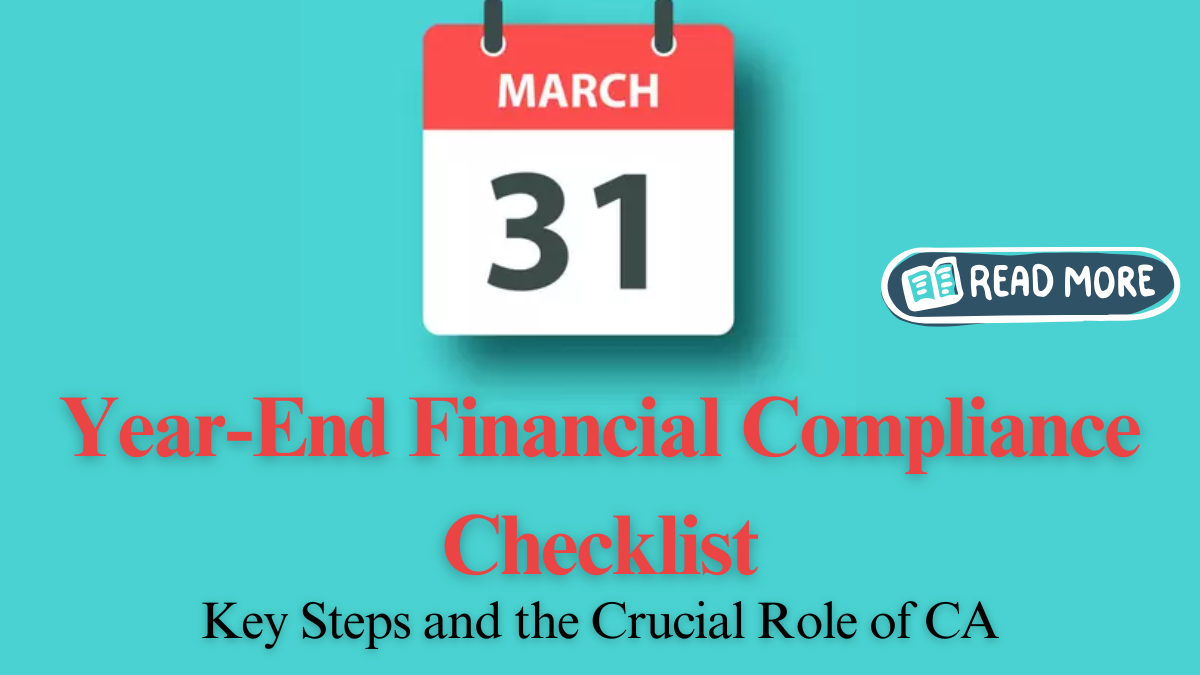As businesses approach the end of their financial year, it is essential to ensure that all compliance requirements are met to avoid potential issues down the road. Year-end financial compliance is not only a legal obligation but also a strategic opportunity to streamline operations, optimize tax planning, and set a solid foundation for the upcoming year. Chartered accountants (CAs) play a crucial role in guiding businesses through the compliance process, ensuring that financial records are accurate and regulatory standards are adhered to.
In this article, we will walk through a year-end financial checklist for businesses and highlight the role of chartered accountants in ensuring smooth financial operations.

Key Steps in Year-End Financial Compliance
A business must complete several critical tasks by the end of its financial year to ensure compliance and avoid penalties. These tasks, often requiring detailed attention, help maintain accurate financial records and prepare businesses for future growth.
1. Physical Verification of Inventory
Before closing the financial year, businesses must conduct a physical verification of inventory. The value of inventory reported in the books must match the actual stock available as of the year-end date. Discrepancies between the recorded stock and actual stock can impact financial reporting and tax liabilities. Chartered accountants can guide businesses in accurately reconciling inventory records to ensure proper adjustments are made in the financial statements.
2. Director and Partner Remuneration, Loan Interest
Any remuneration paid to directors or partners, as well as the interest on unsecured loans, should be correctly recorded. These payments need to comply with both company policies and statutory regulations. Failure to account for these transactions accurately can have significant tax implications. Chartered accountants ensure that all such payments are properly documented in the financial year they belong to, minimizing tax risks and optimizing profit distribution.
3. Reconciliation of Prepaid and Accrued Expenses
Businesses need to examine prepaid expenses (payments made in advance for services) and accrued expenses (costs that have been incurred but not yet paid). It is essential to adjust the financial records so that only expenses relevant to the current financial year are reflected in the profit and loss statement. Chartered accountants assist businesses in ensuring that these adjustments are correctly handled to avoid overstating or understating financial results.
4. Depreciation and Foreign Exchange Adjustments
Properly accounting for depreciation of assets is crucial to maintaining accurate financial statements. Chartered accountants help businesses calculate depreciation based on the applicable accounting standards. Similarly, businesses dealing with foreign currency transactions must adjust their foreign exchange balances according to the current exchange rate to ensure accurate reporting of assets and liabilities.
5. MSME Payment Compliance
Businesses must verify that payments to Micro, Small, and Medium Enterprises (MSMEs) were made within the prescribed timeframe, which is generally 15 or 45 days, depending on the agreement. Failure to meet these payment deadlines may result in penalties and tax complications. Chartered accountants can assist in ensuring compliance with MSME payment rules and help businesses avoid unnecessary penalties.
6. Tax Deducted at Source (TDS) Compliance
For any year-end expenses, such as audit fees or commissions, businesses must ensure that the appropriate TDS has been deducted and paid to the government. Non-compliance with TDS regulations can lead to penalties and interest charges. Chartered accountants help businesses identify areas where TDS should be deducted, file returns, and ensure timely payments to avoid penalties.
7. Account Confirmations and Reconciliations
It is essential for businesses to confirm that the balances in their books match those of customers, suppliers, and lenders. This helps eliminate any discrepancies and ensures that the financial statements accurately reflect the true financial position of the business. Chartered accountants can manage the reconciliation process and provide assurance during audits.
8. GST Reconciliation
GST reconciliation is another critical year-end task. Businesses must ensure that their GST filings align with their sales and purchase records. Additionally, the Input Tax Credit (ITC) claimed should be verified against supplier reports to avoid discrepancies. Chartered accountants help businesses reconcile their GST returns, ensuring that the correct amount of GST is paid and minimizing the risk of non-compliance.
9. Preparation of Financial Statements and Audit
Once all the above tasks are completed, businesses need to close their books for the year and prepare their financial statements, including the balance sheet, profit and loss account, and cash flow statement. If a statutory audit is required, businesses should ensure that all necessary documentation is available. Chartered accountants play a crucial role in preparing these statements, conducting audits, and providing valuable insights into the financial health of the business.
Strategic Year-End Financial Planning
The end of the financial year also presents an opportunity for businesses to make strategic financial decisions. Tax planning and financial statement review are essential components of this process.
1. Maximizing Tax-Saving Investments
For businesses operating under the old tax regime, tax-saving investments can help reduce taxable income. Investments in Provident Fund (PPF), Employee Linked Savings Scheme (ELSS), and insurance plans are some of the common ways businesses can save on taxes before the year-end. Chartered accountants assist in identifying the best investment options to optimize tax savings and guide businesses in making last-minute investments to reduce their tax burden.
2. Ensuring TDS Accuracy with Form 26AS
Businesses must ensure that their TDS credits match the details in Form 26AS and the Annual Information Statement (AIS). Any mismatches must be corrected before filing tax returns. Chartered accountants help businesses review these forms and make corrections to avoid any issues with tax filings.
3. Corporate Social Responsibility (CSR) Expenditure
For businesses required to comply with CSR obligations, it is essential to allocate and spend funds before the end of the financial year. Proper CSR planning not only helps in avoiding penalties but also aligns the business’s social impact with its corporate values. Chartered accountants ensure that CSR activities are accounted for correctly and help with strategic planning.
4. Compliance with Employee Benefits Regulations
Businesses should review their compliance with employee benefits regulations, including contributions to the Provident Fund (PF), Employees’ State Insurance (ESI), and gratuity. Failure to comply can result in penalties and legal issues. Chartered accountants ensure that all employee-related compliances are met, fostering better relationships with employees and enhancing the business’s reputation.
The Role of Chartered Accountants and Automation
Chartered accountants (CAs) play a vital role in ensuring that businesses adhere to legal and regulatory compliance requirements. They help businesses stay on top of tax obligations, streamline financial reporting, and reduce the risks of non-compliance. By leveraging their expertise, businesses can minimize penalties, optimize tax structures, and ensure smoother audits.
Furthermore, automation tools can significantly enhance the efficiency of financial operations. Cloud accounting software helps reduce human errors and provides better security for financial data. Automated systems can assist with GST filings, payroll management, and accounting reports, reducing the time and effort required for these tasks. AI-based tools can even help predict cash flows and improve financial decision-making.
Year-End Financial Compliance Checklist
To provide a clearer overview of the key compliance tasks, here’s a summarized Year-End Financial Compliance Checklist:
| Compliance Task | Description | Role of Chartered Accountant |
|---|---|---|
| Physical Verification of Inventory | Ensure that stock on hand as of March 31 matches the recorded inventory value. | Guide in performing physical stock count, reconciling discrepancies, and adjusting financial records. |
| Director/Partner Remuneration & Loan Interest | Ensure that any salaries, fees, and interest payments to directors/partners are correctly accounted for. | Ensure proper documentation, adherence to company policies, and regulatory limits. |
| Reconciliation of Prepaid & Accrued Expenses | Review prepaid expenses (paid in advance) and accrued expenses (incurred but unpaid). | Adjust accounts to ensure only relevant year’s expenses are recorded in profit and loss. |
| Depreciation and Foreign Exchange Adjustments | Depreciate assets and adjust foreign currency balances to the current exchange rate. | Calculate depreciation correctly, and update asset and liability balances for foreign exchange adjustments. |
| MSME Payment Compliance | Verify that payments to Micro and Small Enterprises (MSMEs) are made within the due window (15/45 days). | Ensure compliance with MSME payment deadlines to avoid penalties. |
| Tax Deduction at Source (TDS) | Verify that TDS has been deducted for year-end expenses, including audit fees and commissions. | Ensure timely payment and filing of TDS returns to avoid penalties for non-compliance. |
| Account Confirmations | Confirm balances with customers, suppliers, and lenders to ensure financial records match. | Assist in obtaining confirmations and resolving discrepancies in financial records. |
| GST Reconciliation | Reconcile GST filings with sales/purchase records and verify Input Tax Credit (ITC) claims. | Guide in matching GST returns with business records and ensure timely payments to avoid penalties. |
| Preparation of Financial Statements and Audit | Close the books and prepare financial statements (balance sheet, profit and loss, cash flow). | Assist in preparing financial statements, conduct audits, and ensure accurate reporting of financial performance. |
| Tax-Saving Investments | Explore last-minute tax-saving options like PPF, ELSS, and insurance plans before the year-end. | Advise on optimal investment options to reduce tax liabilities and optimize financial planning. |
| TDS Matching with Form 26AS and AIS | Verify that TDS credits match with Form 26AS and the Annual Information Statement (AIS). | Assist in identifying and correcting discrepancies in TDS credits to ensure accurate tax filings. |
| Corporate Social Responsibility (CSR) Compliance | Ensure CSR obligations are met before the financial year ends to avoid penalties. | Help plan and track CSR spending to align with legal requirements and company values. |
| Compliance with Employee Benefits | Ensure adherence to Provident Fund (PF), Employees’ State Insurance (ESI), and Gratuity rules. | Ensure all employee-related statutory benefits are compliant and contribute to boosting employee morale. |
Frequently Asked Questions
1. What is the importance of year-end financial compliance?
Year-end financial compliance ensures that a business adheres to legal regulations, maintains accurate financial records, and optimizes tax planning, helping avoid penalties and facilitating smooth audits.
2. What are the key steps in year-end financial compliance?
Key steps include verifying inventory, reconciling prepaid and accrued expenses, ensuring TDS compliance, reconciling GST filings, and preparing financial statements for audit.
3. How can a chartered accountant assist with year-end compliance?
Chartered accountants help with tax planning, preparing financial statements, ensuring compliance with regulatory requirements, and advising on automation tools to improve efficiency.
4. What is the role of automation in year-end compliance?
Automation tools can streamline financial operations, reduce errors, improve accuracy in filings (e.g., GST), and help businesses make better financial decisions.
5. What are CSR obligations, and why are they important for businesses?
Corporate Social Responsibility (CSR) obligations require businesses to spend a portion of their profits on social initiatives. Meeting these obligations is crucial to avoid penalties and align the business with its ethical values.
Click here to learn more.
Pari is a passionate writer known for captivating stories that blend imagination and reality. Inspired by travel, history, and everyday moments, Pari crafts narratives that resonate deeply with readers.
